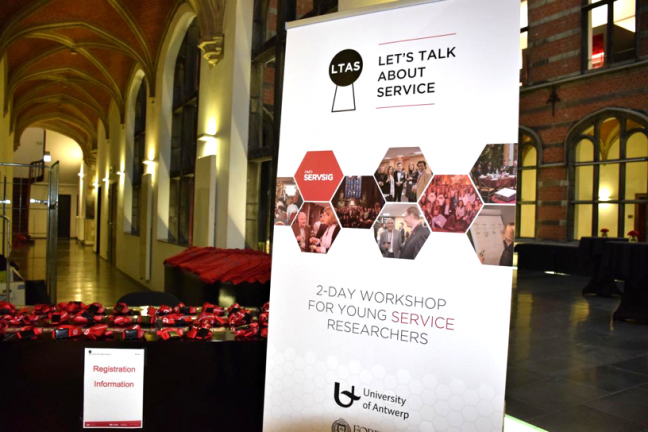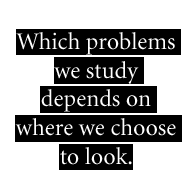I sometimes think about the role of marketing and service research in the larger academic context. What’s our purpose, and how should we orient ourselves towards ”the real world”? Recently I got a chance to reflect on this issue together with around 40 other young scholars from around the world, in the Let’s Talk About Service workshop in Antwerp, Belgium. This year’s theme revolved around bridging academia and business, so during the workshop we worked in smaller teams around real-world company cases, constructing research proposals with aims ranging from identifying what value public broadcasters can bring to people, to studying how service networks can be formed around preventive healthcare. I think these are great examples of questions where academics in general, and service researchers in particular, can make substantial contributions to practice.

Photo: Bram Roosens
Contributing to practice was indeed a central theme of the workshop, and it was pointed out by all of the keynote speakers. As Michael Brady, professor and editor of Journal of Service Research, said in his keynote, marketing is an applied science, and therefore we should have something to say to practitioners. This perspective reflects a much more active role of researchers in society than merely observing from a distance and refraining from taking a stance. This reminded me of Elazar Pedhazur and Liora Pedhazur Schmelkin’s argument in their very lucid book from 1991 on measurement and research design, that studying aspects of social institutions (such as markets and companies) always implies that we are faced with the question of what we ought to do about these? If a marketing researcher discovers for instance performance issues, detrimental effects, or unanswered consumer needs, she is faced with the task of making normative claims.
As all of the speakers argued, we should use our eyes and ears to find out what’s happening in organisations, businesses and societies. This can mean going out and asking managers about what challenges and problems they currently are facing, or simply observing events in our own lives. Of course, while service research is closely connected to the world of business and markets, it stretches to other societal arenas as well. Besides a growing interest in health care, some of the studies within service research that I’ve stumbled upon have for instance dealt with issues around homelessness, public transport, and prisons. Which problems we study depends on where we choose to look.
But while we should engage with real-world issues and finding problems that companies, consumers and societies are faced with, we are still not consultants. This means that the research that’s carried out should also advance our knowledge in a more general way, as it should contribute to theoretical discussions. Irene Ng, professor of marketing and service systems, pointed this out in her keynote, as she explained that solutions to specific problems should be scalable and transferable to other contexts, or they should be able to be developed into generic tools. This, arguably, constitutes a theoretical contribution. As someone once said, “there is nothing as practical as a good theory”.
 I think Michael Brady made a terrific point in defining managerially relevant research as research that alters managers’ worldviews in some way. This gives us a lot of leeway: worldviews can relate to anything from sales processes to environmental sustainability. Jay Kandampully, professor in services management and hospitality, spoke along the same lines concerning theoretical contributions, as he noted that we should develop ideas that influence and advance current thinking. Brady’s and Kandampully’s views echoed the arguments made by the American sociologist Murray Davis in his seminal article “That’s interesting!” from 1971, in which he proposed that many of the most influential research contributions – from thinkers such as Max Weber, Marshall McLuhan, and Karl Marx – have become so influential precisely because they altered our worldviews in some ways.
I think Michael Brady made a terrific point in defining managerially relevant research as research that alters managers’ worldviews in some way. This gives us a lot of leeway: worldviews can relate to anything from sales processes to environmental sustainability. Jay Kandampully, professor in services management and hospitality, spoke along the same lines concerning theoretical contributions, as he noted that we should develop ideas that influence and advance current thinking. Brady’s and Kandampully’s views echoed the arguments made by the American sociologist Murray Davis in his seminal article “That’s interesting!” from 1971, in which he proposed that many of the most influential research contributions – from thinkers such as Max Weber, Marshall McLuhan, and Karl Marx – have become so influential precisely because they altered our worldviews in some ways.
In the end, the Let’s Talk About Service workshop gave me a lot of intellectual input, and it worked as a splendid arena for getting in touch with some of the problems that companies and organisations are facing and for developing research proposals around these. Also, the workshop provided me with a good answer to my initial question of what our role as service researchers can be. As Jay Kandampully so wonderfully stated in his keynote: ”solving problems is the fundamental essence of service”. Now it’s up to us to find those problems.
Doctoral Student
